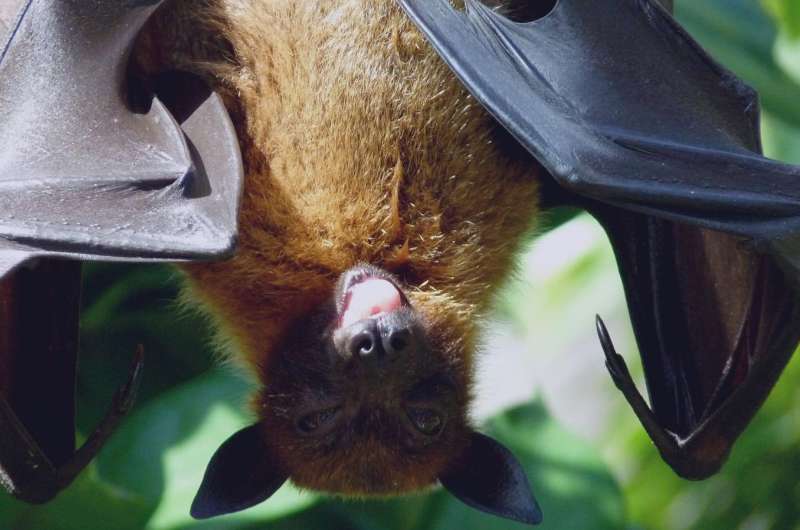Young bats learn bat 'dialects' from their nestmates

Young bats adopt a specific "dialect" spoken by their own colonies, even when this dialect differs from the bat "mother tongue," a new study publishing 31 October in the open access journal PLOS Biology shows. By offering insight into the evolutionary origins of language acquisition skills, the study, led by Dr. Yossi Yovel of Tel Aviv University, and his students Yosef Prat and Lindsay Azoulay, calls into question the uniqueness of this skill in humans.
For the research, the team raised 14 pups with their mothers in three different colonies. In these laboratory colonies, the scientists used speakers to play three specific subsets of natural bat vocalizations. The researchers exposed the young bats to the recordings over a period of one year, until they reached adulthood.
Although the young bats were exposed to their mothers' 'normal' dialect and could communicate with their mothers, each group developed a dialect resembling the one they were exposed to through the recordings.
"The difference between the vocalizations of the mother bat and those of the colony are akin to a London accent and, say, a Scottish accent," Dr. Yovel explains. "The pups heard their mothers' 'London' dialect, but also heard the 'Scottish' dialect mimicked by many dozens of 'Scottish' bats. The pups eventually adopted a dialect that was more similar to the local 'Scottish' dialect than to the 'London' accent of their mothers."
"The ability to learn vocalizations from others is extremely important for speech acquisition in humans, but it's believed to be rare among animals," Dr. Yovel says. "Researchers have believed that this is what makes human language unique.
Songbirds are the most common animal models for 'vocal learning," and they learn songs from specific tutors. These studies typically indicate that a bird learns to sing from one parent. But this study shows that bats listen and learn from an entire colony of several hundred bats, not just from their parents. "In other words," says Yovel, "young bats pick up the dialect vocalized by their surrounding roost-mates."
The researchers will next examine how the acquisition of a new dialect influences the ability of bats to integrate into foreign colonies. "Will they adopt the local dialect or will they be rejected by the group? Or maybe the local colony will change its dialect to adopt that of our bats," Dr. Yovel says. "There are many interesting avenues yet to explore."
More information: Prat Y, Azoulay L, Dor R, Yovel Y (2017) Crowd vocal learning induces vocal dialects in bats: Playback of conspecifics shapes fundamental frequency usage by pups. PLoS Biol 15(10): e2002556. doi.org/10.1371/journal.pbio.2002556
Journal information: PLoS Biology
Provided by Public Library of Science


















